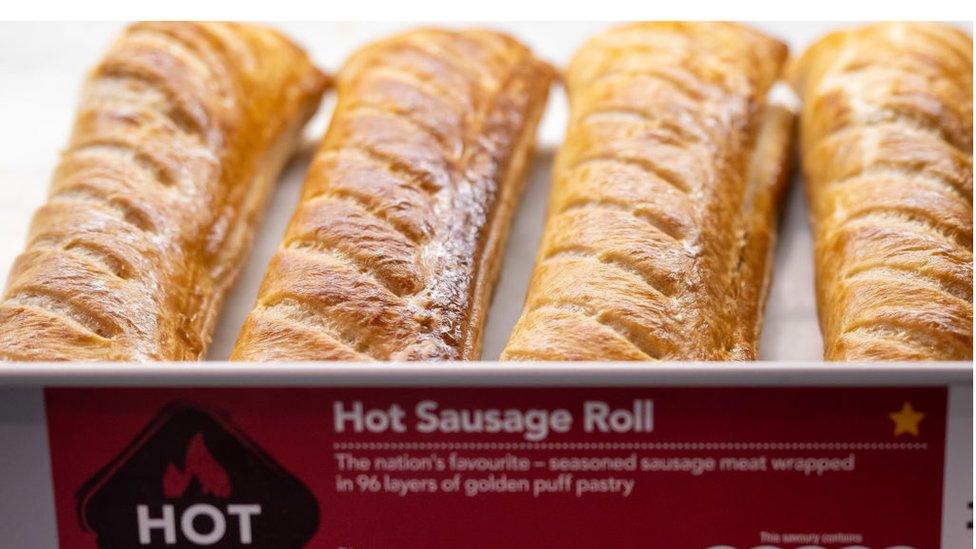Why are bakers' fortunes on the rise?
- Published
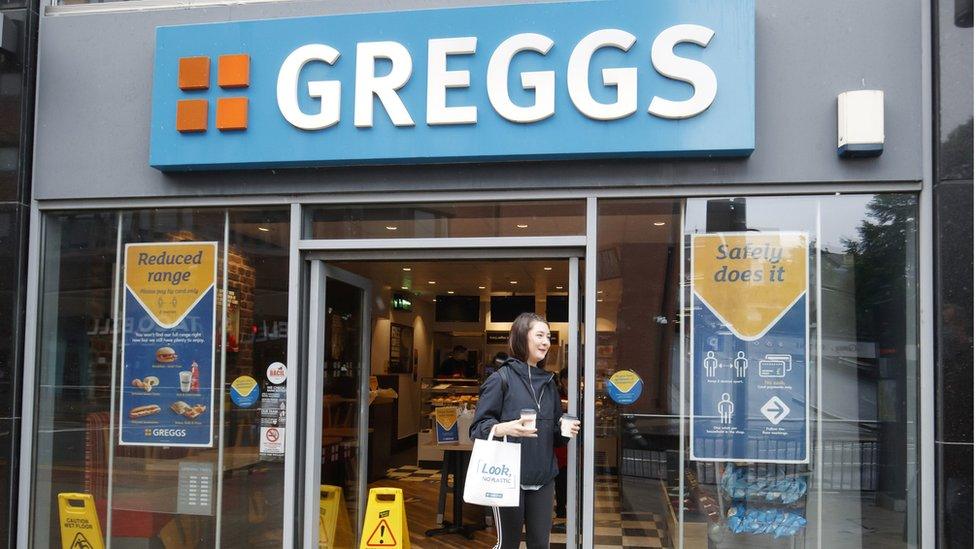
Greggs was riding high before lockdown hit
Lockdown loaf-making became a symbol of how people coped with the coronavirus crisis - and there seems to have been a similar uplift for high street bakers by the dozen. BBC News finds out why the future seems sweet for sourdough.
Prior to the pandemic, the buzz on the British high street centred around Newcastle-based bakers Greggs.
The sausage roll stalwart famously reinvented its most famous product at the start of 2019, with its vegan version helping sales surge.
But, like its neighbours, Greggs took a hit during the pandemic, with many of its shops closing for significant spells.
The popular chain bakery is aiming to bounce back, with sales rebounding and plans to open new outlets.
It is also expanding its vegan range and plans to extend the opening hours across 500 stores, with more evening menu options available.
But it is far from the only baker that has risen to the challenges of recent years with pain-nache.

'We are better off than before'
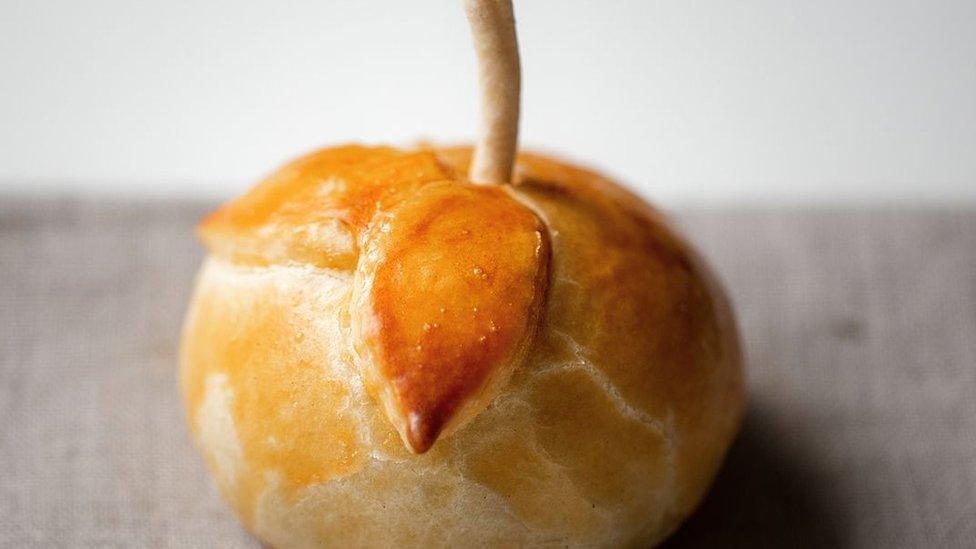
Many of the baker's trade accounts have returned
Hambleton Bakery is a small artisan chain, based in Rutland, with six shops and more than 150 wholesale accounts in the surrounding area.
When the pandemic hit, it lost a number of those accounts, as hotels and restaurants closed.
But, according to co-owner Tim Hart, trade in the shops actually grew, with homeworkers turning out to buy cheese straws, tea cakes and sourdoughs.
"As a result, we are better off than before," he said.
"Our clients are all at home instead of rushing off to work.
"Before the pandemic, people were time-poor and had to consolidate their shopping at the supermarket.
"But home working has made people more interested in going to the independent shops on their doorsteps.
"That's a great benefit to us and we have kept a lot of those customers we have gained during lockdown."
When restrictions eased, a lot of the restaurants, hotels, pubs and delis Hambleton supplied reopened. And the fact many families spent their 2020 holidays in Britain, instead of travelling abroad, meant there was considerable demand.
The business has now opened a £2m purpose-built manufacturing site near the A1 to accommodate additional accounts.
"We have been turning away wholesale accounts for two years because we reached capacity in our old building, but now we can take on more," Mr Hart said.
"We also want to open new shops and are aiming to turn our old manufacturing facility into a café.
"Overall, it's been very positive for the bakery business."

'We can respond to things quickly'
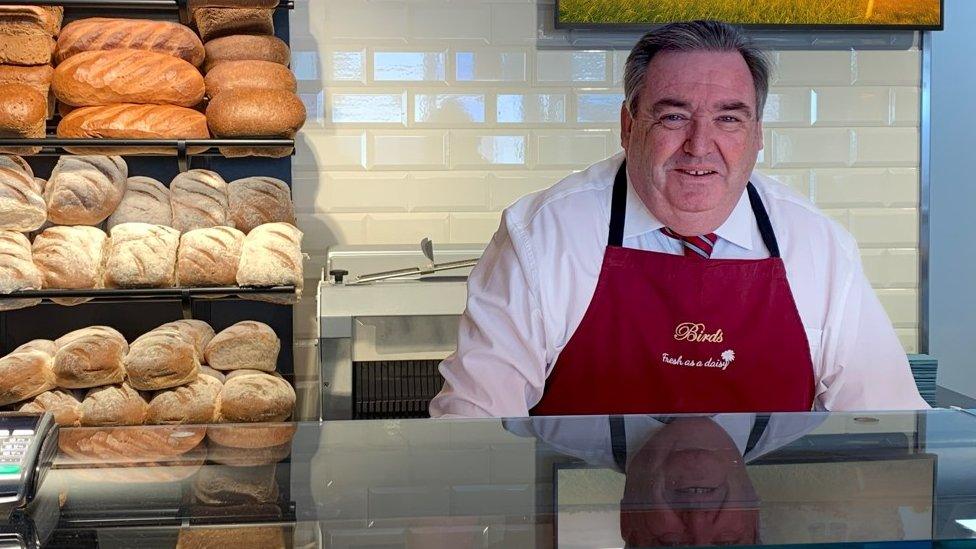
Mike Holling, of Birds, says the pandemic was challenging
Best known for its cream cakes and its caramel doughnuts, Birds is something of an institution in the East Midlands.
The business was founded by three Derby brothers on their return from World War One and it remains a family-run business, celebrating its centenary in 2019.
Having survived so many 20th Century crises, the business had a level of resilience built in, according to Mike Holling, Birds's sales and marketing director.
"The pandemic was very challenging but we kept going," he said.
"The business has had to adapt. It's not been easy.
"We lost two stores during the pandemic. But we are building up again."
Indeed, Birds is also expanding with a new shop due to open in Colwick, Nottinghamshire.
This will take its total of stores to 63, from 56 five years ago.
The business is conscious further challenges lie ahead - not least the war in Ukraine, which has impacted wheat prices.
"At the moment there are major pressures on costs but we will continue to invest in the business," Mr Holling said.
The business stretches across Derbyshire, Nottinghamshire and Leicestershire which, Mr Holling said, was an important factor in Birds's ability to maintain stability and quality.
"That's why we always keep to the East Midlands - it means we can deliver freshly-made products every day," he said.
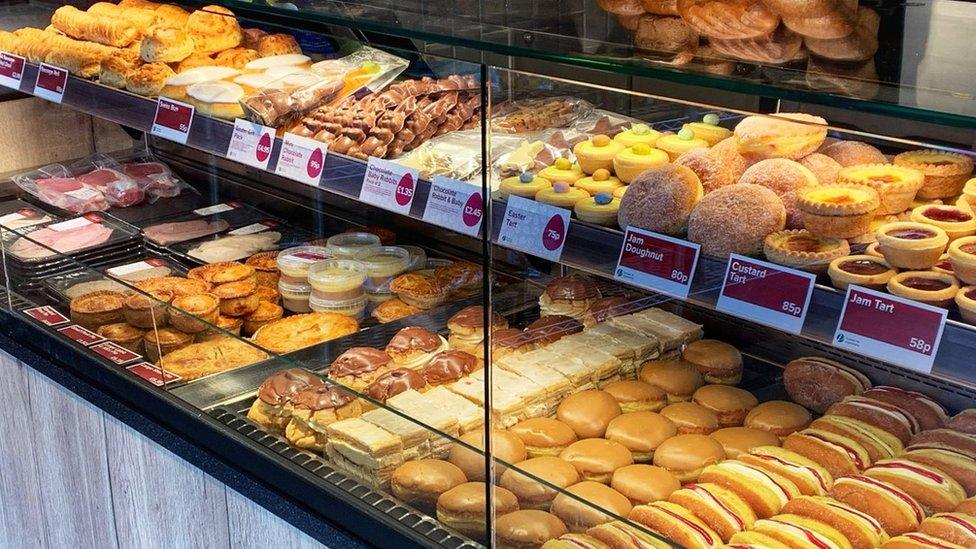
Despite cost pressures, Birds says it is continuing to invest in new stores
"We are still a family business, into our fourth generation which is unusual for the high street.
"But that also means we can respond to things relatively quickly. During the pandemic we diversified into online home delivery, a completely new revenue stream. It helps keep the business moving forwards."

'It takes people back to the pre-supermarket days'
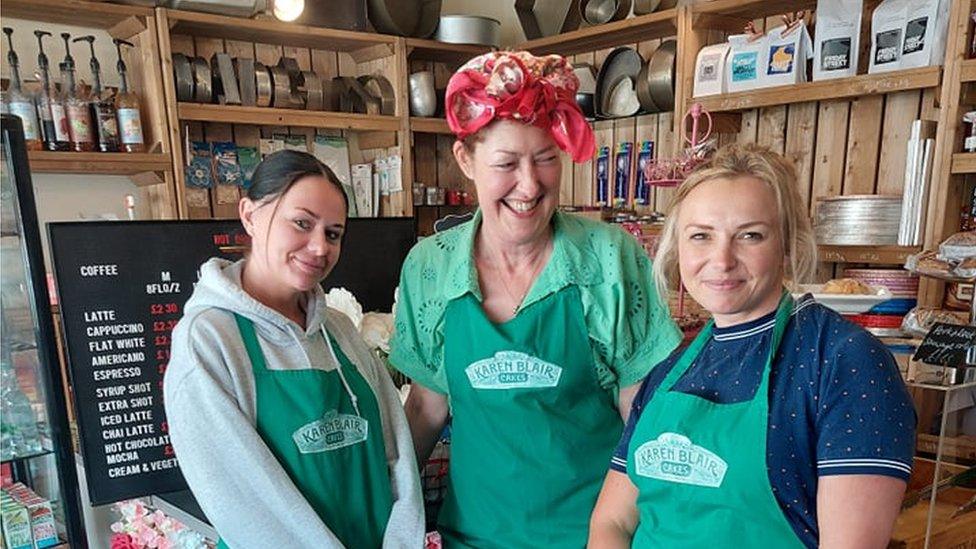
Karen (centre) says converting into a bakery saved her business
Karen Blair had run her wedding cake and decorating supplies business for more than a decade when the pandemic hit.
Her business was deemed non-essential and was, therefore, forced to close. In addition, Mrs Blair's business was based in Leicester, a city that was subject to restrictions that lasted longer than anywhere else in England.
"We knew we weren't going to survive as a business the way we were," she said. "Weddings were being cancelled due to the pandemic. We had to do something."
Converting her retail outlet, which is based on a parade of shops on a suburban street, into a bakery was a decision that "just made sense", she said.
"My son and I refurbished the shop when we were allowed out for more than an hour a day and we started selling sandwiches, cakes and bread," she said.
Karen said she loves life as a bakery owner. She bakes all of the cakes and savouries herself and buys in the bread from local suppliers.
Profits have risen, allowing her to reinvest in the business and take on more staff. And while she has started to take wedding cake orders once more, she plans to continue with the bakery.
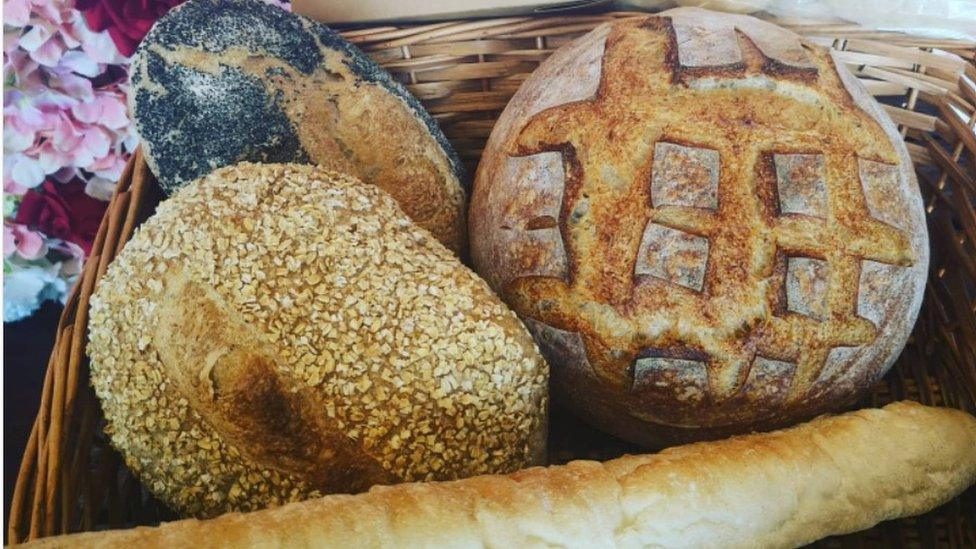
Karen says profits have increased since she relaunched as a bakery
"We never used to know the people who lived across the road but now people pop in and chat all the time," she said.
"I think it takes people back to the pre-supermarket days, where they could get all of their shopping done at the butchers, the bakers and the greengrocers."

Shocks for the sector?
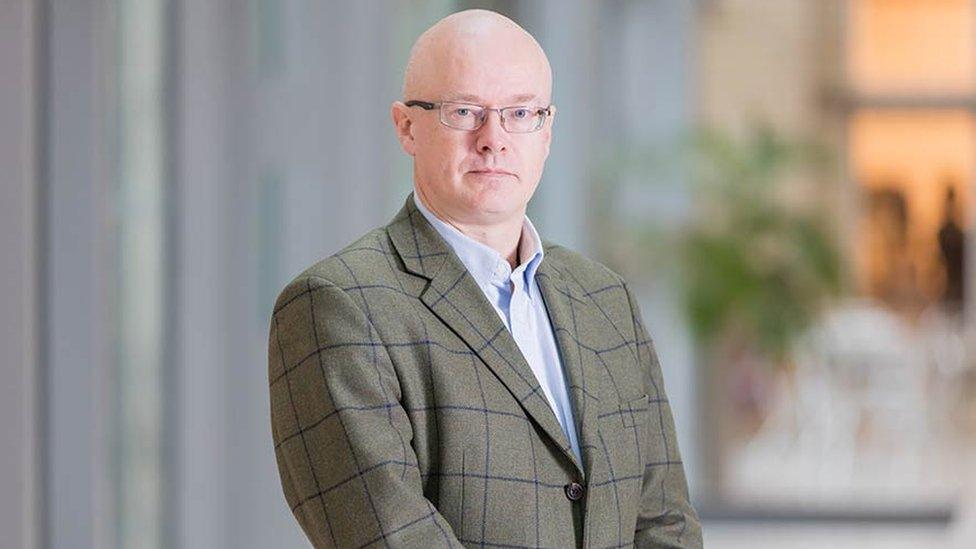
Mr Rossiter says food retailers performed well during lockdown
Will Rossiter, associate professor of the economics department at Nottingham Business School, said: "I'm not surprised that bakeries, particularly those that are based in suburban locations, have done pretty well.
"One of the things we saw through the pandemic was that certain sectors performed much better than others and generally, food retail did pretty well.
"That was also linked to the kind of locations people were going to - including me. I found myself going round the corner to the local baker and if I had still been working in city centre Nottingham, I wouldn't have done that."
With hybrid working apparently here to stay, Mr Rossiter said the future did appear positive - but there could be some shocks for the sector on the way in the shape of the effects of the war in Ukraine.
"Russia and Ukraine account for something like 30% of the global supply of wheat," he said.
"That is likely to affect the sector so one would say that's a bit of a risk going forwards."

Follow BBC East Midlands on Facebook, external, Twitter, external, or Instagram, external. Send your story ideas to eastmidsnews@bbc.co.uk, external.
Related topics
- Published30 June 2022
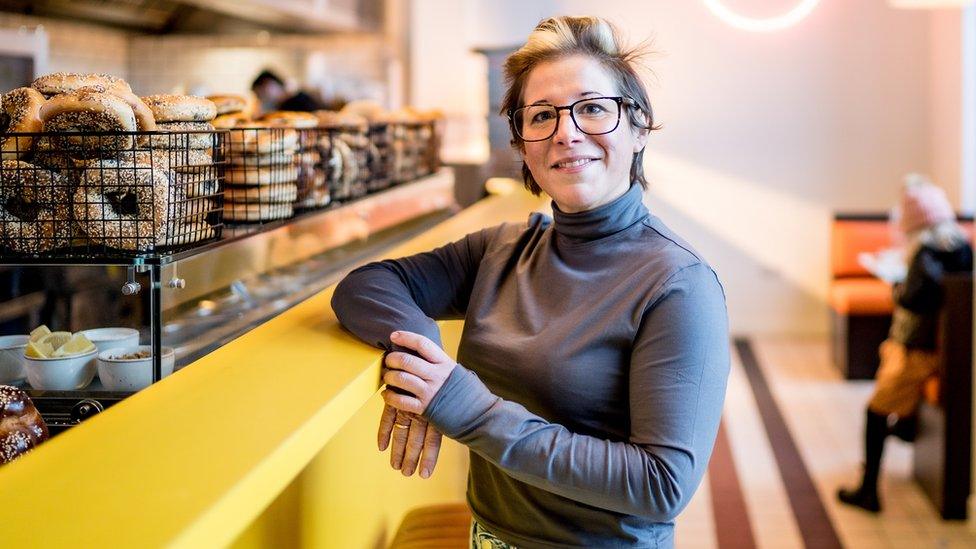
- Published8 March 2022
